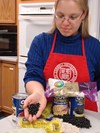Posted 5/28/2010
by Norma Maring
Cornell Cooperative Extension’s Nutrition & Health Program in Fulton and Montgomery Counties will present “Preserving Herbs” on Tuesday, June 15, 6:00 to 8:00 pm. The class will be taught in the their Teaching Kitchen, 55 East Main Street, Lower Level, Johnstown.
The class will focus on freezing and drying a variety of fresh herbs and garlic. Participants will learn about combining herbs and matching those combinations to meat & poultry, fish, vegetables & soups or sauce. The basics of selecting and using proper food preservation equipment will be covered.
Class participants will gain hands-on experience, working in small groups to prepare and preserve pesto and herb vinegars, making samples to take home. General food preservation information will be shared. Participants will take home a packet containing recipes, nutrition information, and safe storage tips. The class is limited to 12 persons.
The “Preserving Herbs” class costs $15.00 per person and registration is required by June 14th. To register, call 518-762-3909, x 101. For more information contact Roseann Doran at extension 116.
Posted 5/21/2010
by From the Cornell Chronicle Online
Statins -- popular drugs that lower cholesterol -- help protect some people against colorectal cancer, but not other people. Now researchers at NewYork-Presbyterian Hospital/Weill Cornell Medical Center report why.
Almost half -- 44 percent -- of Caucasians taking statins are probably not protected against cancer as well as other people because of a particular inherited gene variant, the researchers report in the May issue of Cancer Prevention Research.
The finding might help personalize the use of statins by using a test to determine if patients have the "right" gene to benefit from current statin drugs and by providing insight into how to create a new class of statins for those who have the "wrong" gene profile.
Posted 5/18/2010
by Roseann Doran

Summer health advice abounds from the Weill Cornell Medical College's Web site from Dr. Holly Andersen, director of education and outreach at the Ronald O. Perelman Heart Institute at New York-Presbyterian Hospital/Weill Cornell Medical Center, where she details numerous tips on:
* Exercising safely during the summer;
* Making healthy sunglass choices;
* Protecting "tweens" and teens from sun damage;
* Slimming down for swimsuit season;
* Helping seniors keep their cool during summer heat waves and preventing heat-related injuries;
* Preparing children for summer camp;
* Treating sports injuries with the R.I.C.E. (rest, ice, compress, elevate) method;
* Preventing summertime sniffles and other allergic reactions;
* Celebrating safely and responsibly;
* Preparing for vacation with a health checklist; and
* Avoiding burns from barbecues, fireworks and other activities that can pose hazards.
Posted 5/12/2010
by Roseann Doran

Cornell Cooperative Extension’s next cooking class, “It’s Bean Great!” will be held on Tuesday, May 18th from 6:00 to 7:30 p.m. in CCEFM’s Teaching Kitchen, Lower Level, 55 East Main Street, Johnstown.
The class will feature tips on cooking, storing, and using different kinds of beans to create tasty, healthy dishes. From hearty entrees, to creamy dips or velvety soups, class participants will learn how to incorporate and enjoy eating beans.
The class is $12 and includes hands-on activities, cooking demonstrations and tasting. Participants will take home a packet containing recipes, nutrition information along with cooking and storage tips.
Pre-registration is required and space is limited. Call Cornell Cooperative Extension at 518-762-3909.
Posted 5/5/2010
by Tom Rushmer

Keep the pasta bowl off the table and eat 20 percent less
ANAHEIM, CA: Can eating less be as simple as leaving serving dishes on the stove and off the table? According to a team of researchers from Cornell University, it can.
At this week's Experimental Biology conference in Anaheim, Calif., researchers led by Brian Wansink, director of the Cornell Food and Brand Lab, shared findings of their "Serve Here; Eat There" study of 78 adults.
"We looked at whether serving foods from the kitchen counter, instead of at the table, would reduce the number of times a person refilled his or her plate," Wansink said.
"Quite simply, it is a case of 'out of sight, out of mind,'" he continued. "When we kept the serving dishes off the table, people ate 20% fewer calories. Men ate close to 29% less."
The same strategy can be used to help increase the consumption of healthier foods, Wansink explained.
"If fruits and vegetables are kept in plain sight, we'll be much more likely to choose them, rather than a piece of cake hidden in the refrigerator."
Dining environment, plate and portion size, and other hidden cues that determine what, when and how much we eat are familiar topics in Wansink's work. He is the author of Mindless Eating: Why We Eat More Than We Think.
Experimental Biology is an annual meeting of nearly 13,000 scientists and exhibitors from the fields of anatomy, physiology, biochemistry, molecular biology, pathology, nutrition, pharmacology and immunology. Conference participants come from the ranks of universities, government agencies, non-profit organizations and private corporations.
For more information, contact the Cornell Food and Brand Lab at foodandbrandlab@cornell.edu, or visit mindlesseating.org.
Image: Professor Brian Wansink and a team of researchers from Cornell University shared the findings of their "Serve Here; Eat There " study at the Experimental Biology conference in Anaheim, Calif....
Posted 5/4/2010
by Roseann Doran

Safe, high quality home canned foods begin with the right equipment used properly. Why risk losing your time and food dollar through spoilage? Check and assemble good equipment before the season begins, then maintain it well.
- Check jars and bands. Discard chipped jars and rusted or distorted bands.
- Have dial pressure gauges checked.
- Check seals on last summer’s produce.
- Make plans to use up last summer’s produce (both frozen and canned) to make room for new products and to prevent food waste.
- Check files to make sure your food preservation information is complete and up-to-date.
Posted 4/26/2010
by Roseann Doran

Today’s economy continues to steer interest in home food preservation, and successful home canning requires only that you observe simple guidelines.
While home canning can be an ambitious undertaking, it does not always have to be. After all, home canning can be enjoyed by the whole family. From harvesting fruits and vegetables in the family garden to preparing food for canning, to processing, labeling and storing jars, home canning provides something for everyone. Plus, home canning instills a pride of family accomplishment while serving a vital need: putting food on the family’s table.
It also saves money. For every quart of garden-fresh fruits or vegetables preserved, you’ll need one less can of expensive, processed food from the grocery store.
Posted 4/19/2010
by Roseann Doran

Dr. Rhoda Meador, Associate Director of Outreach and Extension in the College of Human Ecology recently posted her observations about the popular TV show, Jamie Oliver’s Food Revolution at the Cornell Human Ecology Blog, "Evidence-Based Living." While the current TV program has created some buzz from which we can all learn, Dr. Meador’s comments remind us that solving the obesity problem in this country is going to take time, effort and the careful team work of concerned citizens and policy makers.
"As we all know, childhood obesity is taking a terrible toll on our kids. There’s no doubt that a crisis of this magnitude requires us to enact policy changes and programs aimed at addressing the problem. But do programs like Oliver’s Food Revolution really work? How do educators, concerned citizens, and policy makers know which programs will give us the best return on our investment?" Meador asks.
To read more about the effectiveness of Food Revolution read Meador’s blog entry on "Evidence-Based Living."
Posted 4/12/2010
by Roseann Doran

When we think about how many calories we are consuming, we sometimes leave out the calories that we consume as beverages. There is some evidence that the body does not respond to calories in beverages the same way it does to calorie in food. Your body may not register the calories you drink, so you could end up consuming more calories than you need. Several research studies point to decreasing sugar-sweetened beverages as a good strategy to decrease calories and help manage body weight. Making some simple changes in the beverages you choose can make a big difference. Select the download and check out these two different days of beverage choices. By making a few changes, the calories drop from over 1,300 to only 370.
Source: A Day of Beverages-Make Good Choices, www.extension.org, Updated: November 19, 2009.
Posted 4/12/2010
by Karen Kosinski

The Nutrtion & Health Program of CCEFM highlighted four main points at the Community Wellness Day on Friday, April 9th, Riverfront Center in Amsterdam. The event was sponsored by Senator Hugh Farley and Catholic Charities.
A colorful exhibit taught attendees to identify good fiber sources and promoted ways to increase individual's intake of fiber to help them reach the recommended 25 grams of fiber in their diet each day. Also featured was comparisons of several sugary drinks and suggested alternatives in addition to suggestions for healthy snacks.
A large exhibit informing people of the availability of local products at the upcoming Mohawk Valley Farm Market on Saturday, April 17th at Alpin Haus on Route 5s, caught the interest of many people at the event.













